Neo-Scholastic Theology and Philosophy Collection (24 vols.)
Digital Logos Edition
Overview
Neo-Scholasticism was a philosophical and theological school of thought that arose in the mid–nineteenth century as a revival of medieval scholasticism, especially of the thought of St. Thomas Aquinas. In the later decades of the nineteenth century and well into the twentieth, Neo-Scholasticism dominated the Catholic intellectual milieu.
These volumes form an integrated study of the intellectual history of Christianity, beginning with the late eleventh century. Virtually all significant medieval philosophers were theologians, and to understand modern theology, one needs to look at the rise of scholasticism and the conjunction of faith and reason. The Neo-Scholastic Theology and Philosophy Collection offers 24 volumes that explain the history of medieval scholasticism, its major theories and proponents, its decline, the Neo-Scholastic resurgence in the nineteenth century, and the overall impact it’s had on Western Christianity. Numerous works in this special collection are dedicated to philosophical studies of the existence of God. These volumes trace the influence of Aristotelian thought and method through the works of Thomas Aquinas and other major theologians, revealing the lineage of theology and philosophy behind modern metaphysics, logic, ethics, psychology, and more.
- Over 10,000 pages of reference material covering scholasticism and Neo-Scholasticism
- Topics including metaphysics, logic, ethics, psychology, and more
- Numerous philosophical studies on the existence of God
Scholasticism was preeminent throughout the high and late Middle Ages, displaced only with the rise of humanism during the Renaissance. Medieval scholasticism was more a method than a system, focusing on authoritative texts, dialectics, and the drawing of ever-more-subtle distinctions. Its goals were the reconciliation of authorities and the production of terms and categories that would allow for clarity of thought. The humanists of the fifteenth and sixteenth centuries attacked medieval scholasticism as incapable of dealing with issues of real moral and social importance and inadequate in its failure to understand that truth could not be corralled within human terminology. In many ways, this attack was unfair, based on a prejudice in favor of poetry and literature over logic and abstract speculation. Nevertheless, scholasticism was displaced in the universities of Europe.
In the nineteenth century, however, in response to the rise of various “Enlightenment” philosophies, scholasticism began receiving renewed interest. Many thinkers of the period saw in scholastic realism an alternative to both the subjectivism and the positivism that were increasingly dominating European thought. These Neo-Scholastics, as they became known, focused especially on the work of Thomas Aquinas; they are sometimes referred to as Neo-Thomists. Pope Leo XIII’s 1879 encyclical Aeterni Patris gave this movement a definitive character and a stamp of official approval within the Catholic Church. It was only with the rise of the Nouvelle Théologie and the Church’s theological shift after Vatican II that Neo-Scholasticism began to decline.
Nevertheless, the movement is of profound importance for the history of theology. In fact, in recent years it has received renewed attention as many theologians have reconsidered its achievements. The Neo-Scholastic Theology and Philosophy Collection offers some of the most important works of the movement. It’s a necessary edition to the library of anyone interested in the history of modern theology.
- Many of the key theological texts leading up to the Reformation were written within this philosophical framework.
- It’s a must-have if you’re interested in church history, including the Reformation and Catholic Counter-Reformation.
- It’s important for understanding such notable theologians as Aquinas and Anselm.
- Title: Neo-Scholastic Theology and Philosophy Collection (24 vols.)
- Authors: Brother Azarias, Charles Coppens, Brother Louis of Poissy, Désiré-Joseph Mercier, John J. Ming, John J. Elmendorf, Richard F. Clarke, John Rickaby, Maurice Ronayne, Francis Aveling, Albert Stӧckl, Thomas Harper, Joseph Rickaby, Bernard Boedder, Giovanni Maria Cornoldi, Charles S. Devas, Michael Maher
- Volumes: 24
- Resources: 21
- Publishers: Kegan Paul, Trench, & Co., Schwartz, Kirwin & Fauss, P. O’Shea, B. Herder, Kegan Paul, Trench, Trübner & Co., Benziger Brothers, James Pott & Co., Catholic Truth Society, Longman, Sands & Co., Macmillan and Co., Art and Book Company, Archibald Constable and Co.
- Print Publication Date: 1888–1923
- Pages: 10,246
- Christian Group: Catholic
- Format: Digital › Logos Research Edition
- Resource ID: {421CABD5-AA8B-401D-A838-690FC8A97840}
Individual Titles
- The Existence of God
- A Systematic Study of the Catholic Religion
- A Brief Textbook of Moral Philosophy
- A Brief Textbook of Logic and Mental Philosophy
- The Metaphysics of the School, vol. 1
- The Metaphysics of the School, vol. 2
- The Metaphysics of the School, vol. 3
- Aristotle and the Christian Church
- Scholasticism
- The First Principles of Knowledge
- Moral Philosophy, or, Ethics and Natural Law
- General Metaphysics
- Handbook of the History of Philosophy: Pre-Scholastic and Scholastic Philosophy
- Elements of Moral Theology
- Elementary Course of Christian Philosophy
- The Physical System of St. Thomas
- A Manual of Modern Scholastic Philosophy, vol. 1
- A Manual of Modern Scholastic Philosophy, vol. 2
- Psychology
- Natural Theology
- Political Economy
- The God of Philosophy
- The Data of Modern Ethics
- God Knowable and Known
This title is included in the following collections
You can save when you purchase this product as part of a collection.
Verbum 9 Diamond Legacy Librar...
$2,999.99$2,999.99Verbum 9 Portfolio Legacy Libr...
$4,749.99$4,749.99Verbum 9 Ultimate Legacy Libra...
$7,749.99$7,749.99Logos 9 Ultimate Legacy Librar...
$24,999.99$24,999.99
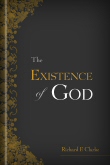
Richard F. Clarke divides The Existence of God into three parts: “The Proof from Reason,” “Subsidiary Arguments,” and “Popular Difficulties.” Written in dialogue form, The Existence of God addresses consciousness, design, causation, conscience, hell, general consent, and more.
Richard F. Clarke writes with the grace and force of a cultured scholar. The dialogue is spirited, the statement clear, and we are led along as softly and pleasantly in the search for truth as the reader of Hume’s famous dialogue is in pursuit of error.
—The Church Review
Richard F. Clarke (1860–1927) was a fellow and tutor at St. John’s College, Oxford. He authored numerous works, including The Ministry of Jesus, Logic, and Meditations on the Life: The Teaching and the Passion of Jesus Christ.
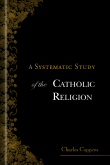
The systematic study of the Catholic religion is usually divided into three parts. The first examines the reasons why all men should accept the claim to infallible teaching on the part of the Catholic Church, the second considers all her doctrines in detail, and the third explains the duties imposed upon her members. A Systematic Study of the Catholic Religion treats these parts respectively in the following chapters:
- The Teaching Authority of the Catholic Church
- Treatise I: The Christian Revelation and Its Credentials
- Treatise II: The Church, the Teacher of Revelation
- The Doctrines of the Catholic Church
- Treatise I: God in Unity and Trinity
- Treatise II: The Creation
- Treatise III: The Incarnation and Redemption
- Treatise IV: Grace
- Treatise V: The Sacraments
- Treatise VI: The Last Things
- The Duties of Catholics
- Treatise I: Duties in General
- Treatise II: The Ten Commandments
- Treatise III: The Commandments of the Church
- Treatise IV: Prayer
Father Coppens’ little volume is worthy of being recommended to the Superiors of schools and colleges, nor only to them, for it is an excellent epitome of Catholic doctrines, running through the succession of subjects usual in a theological course, but explaining them clearly and solidly.
—The Month
Charles Coppens (1835–1920) was a professor of Latin and Greek at St. Louis University from 1855 to 1859; he then taught rhetoric for 10 years in Florissant, MO. From 1881 to 1884 he was president of St. Mary’s College of Kansas. His numerous works include A Practical Introduction to English Rhetoric, Art of Oratorical Composition, and Moral Principles and Medical Practice: The Basis of Medical Jurisprudence.
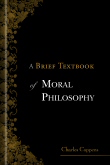
Charles Coppens’ aim in A Brief Textbook of Moral Philosophy is to present to students and readers, especially those unfamiliar with the Latin language, a brief yet clear outline of the system of ethics taught in the Catholic colleges, seminaries, and universities. This system is based on the philosophy of Aristotle. Never before has there been a more urgent call on the part of the people for the lucid exposition and the correct application of sound moral principles—a call answered here by a nineteenth-century text with twenty-first-century solutions. This system of ethics is covered in the following chapters:
- Direction of Human Acts
- The End to Which Human Acts Are to Be Directed
- The Morality of Human Acts
- Law, the Rule of Human Acts
- Individual Rights and Duties
- Rights and Duties in General
- Our Duties to God
- Our Duties to Ourselves
- Our Duties to Other Men
- Rights of Ownership
- Social Rights and Duties
- Society in General
- Domestic Society
- Civil Society
- International Law
He draws out the essentials of ethics. These he presents with excellent method. His defintions are clear, brief, adequate; his explanations full enough for his scope; his illustrations apt; his style concise yet lucid.
—The American Ecclesiastical Review
Remarkable for the positive way in which it settles within the scope of 170 pages all the problems of individual and social life.
—The Critic
That his doctrine should be sound was to be expected, for it is the doctrine which has stood the test of scholastic sifting for many ages, but his explanations are also very exact and lucid, and they are also very practical.
—The Month
Charles Coppens (1835–1920) was a professor of Latin and Greek at St. Louis University from 1855 to 1859; he then taught rhetoric for 10 years in Florissant, MO. From 1881 to 1884 he was president of St. Mary’s College of Kansas. His numerous works include A Practical Introduction to English Rhetoric, Art of Oratorical Composition, and Moral Principles and Medical Practice: The Basis of Medical Jurisprudence.
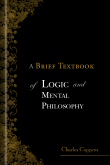
Charles Coppens’ aim in A Brief Textbook of Logic and Mental Philosophy is to present to students and readers, especially those unfamiliar with the Latin language, a brief yet clear outline of the systems of logic, metaphysics, cosmology, psychology, and natural theology taught in the Catholic colleges, seminaries, and universities. Based on the philosophy of Aristotle, Charles Coppens covers these systems in the following chapters:
- Dialectics
- Simple Apprehensions and Judgments
- Reasoning
- Critical Logic
- The Nature of Certainty
- The Existence of Certainty
- The Means of Attaining Certainty
- The Ultimate Criterion of Certainty
- General Metaphysics
- The Nature of Being
- The Transcendental Attributes of Being
- The Categories
- Cause and Effect
- The Chief Perfections of Being
- Cosmology
- The Origin of the World
- Purpose and Perfection of the World
- The Laws that Govern the World
- The Constituent Elements of Matter
- The General Properties of Bodies
- Psychology
- The Specific Nature of Plants and Animals
- Sensitive and Rational Cognition
- Sensitive and Rational Appetite
- The Nature of the Human Soul
- Origin and Destiny of the Human Soul
- Natural Theology
- The Existence of God
- The Essence of God
- The Quiescent Attributes of God
- The Operative Attributes of God
Father Coppens, we think, has produced a book which will meet al the requirements of the English student of philosophy. It embodies a thorough course of Logic and Metaphysics, expressed in clear, concise language.
—Ave Maria
If we were to characterize the present work of Father Coppens in a sentence, we could call it Philosophy Simplified; for in the treatment, style, and terminology, the technical is eschewed as far as possible; and we are indebted to Father Coppens for some English equivalents to philosophical Latin which cannot fail to prove of great service to the reader of metaphysical principles in every day discussions.
—Church Progress
Father Coppens’ book will be a safe, a very safe guide, and a very easy one, considering the subject matter, for young students of philosophy.
—American Ecclesiastical Review
The teaching is clear, orderly, and exact; and what is of great consequence, thoroughly loyal to the scholastic doctrine.
—Dublin Review
It is almost impossible to read newspapers or magazines without encountering articles on topics not to be understood without knowledge of these subjects, and it is well that the young student should be prepared to detect their fallacies. This book will give him the necessary knowledge, and will also increase his pleasure in reading really able arguments.
—The Pilot
Charles Coppens (1835–1920) was a professor of Latin and Greek at St. Louis University from 1855 to 1859; he then taught rhetoric for 10 years in Florissant, MO. From 1881 to 1884 he was president of St. Mary’s College of Kansas. His numerous works include A Practical Introduction to English Rhetoric, Art of Oratorical Composition, and Moral Principles and Medical Practice: The Basis of Medical Jurisprudence.
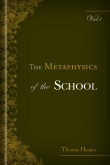
In the three-volume Metaphysics of the School, Thomas Harper first defends Scholasticism as a valid method of critical thought. He then moves systematically through the major subjects of metaphysics, taking account of the teachings of the major scholastics, such as Thomas Aquinas and Francisco Suárez. Volume one is divided into three sections:
- The Definition
- Being
- Attributes of Being
Although Father Harper disclaims originality, the simple justice must be done him by remarking, that he has shown considerable skill in the production of apt illustrations, and in dealing with the modern temper. . . We shall be curious to watch the fate of this unusual metaphysical venture.
—The Westminster Review
If the clergy of either communion in this country could be brought to study Father Harper’s book, we should augur well for a sounder theology even in the next generation.
—The Church Quarterly Review
A grand monument of the learning, the power, and the patience of one man . . .
—Dublin Review
Of Mr. Harper’s share in this independent summary of doctrines, his great industry and carefulness, and the sympathetic intelligence with his author everywhere exhibited, we can only speak in terms of sincere respect. He has contributed not only to the science but the more literary and excursive aspect of the subject.
—The Scotsman
It is a book without which no gentleman’s library can be considered complete.
—Dublin Evening Mail
Thomas Harper (1821–1893) was educated at Queens College, Oxford, and he worked for five years as a curate before converting to the Catholic faith. In 1852, he entered the Society of Jesus and went on to study at the English Jesuit Theological College. He was ordained as a priest in 1859, and two years later, he served as the chair of logic and general metaphysics at St. Mary’s Hall in Stonyhurst. His works include Peace through the Truth, Lectures on Papal Infallibility, and God the True, the Good, and the Beautiful.
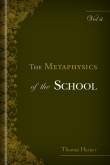
In the three-volume Metaphysics of the School, Thomas Harper first defends Scholasticism as a valid method of critical thought. He then moves systematically through the major subjects of metaphysics, taking account of the teachings of the major scholastics, such as Thomas Aquinas and Francisco Suárez. Volume two is divided into two sections:
- Principles of Being
- Causes of Being, part 1
It is a book full of courage and full of ability . . . In order that the reader may understand his polemic, our author leads up to it by a review of Descartes, and a more lengthened examination of Hume. He evidently knows the authors he criticizes at first hand, and especially to Hume and Kant he has given no ordinary share of attention.
—The Spectator
His criticism of Sir William Hamilton’s treatment of the (logical) principle of identity, and still more his searching inquiry into Kant’s theory of synthetical judgments à prior, prove that Mr. Harper is richly endowed with metaphysical acumen.
—British Quarterly Review
There is no want of vigor and intelligence here in the author’s polemic. To say nothing of his own speculative power, the care and labor he bestows on the general exposition of the scholastic doctrines are truly astonishing.
—Mind
This work will be a textbook not merely for the metaphysician of the present, but of any generation . . . The author manages to make the rather difficult subject of the scholastic philosophy intelligible to the general world. Everyone who reads it will read it again. No one now will have the assurance to say that the scholastic philosophy is still unintelligible to English students.
—Public Opinion
Thomas Harper (1821–1893) was educated at Queens College, Oxford, and he worked for five years as a curate before converting to the Catholic faith. In 1852, he entered the Society of Jesus and went on to study at the English Jesuit Theological College. He was ordained as a priest in 1859, and two years later, he served as the chair of logic and general metaphysics at St. Mary’s Hall in Stonyhurst. His works include Peace through the Truth, Lectures on Papal Infallibility, and God the True, the Good, and the Beautiful.
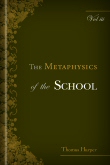
In the three-volume Metaphysics of the School, Thomas Harper first defends Scholasticism as a valid method of critical thought. He then moves systematically through the major subjects of metaphysics, taking account of the teachings of the major scholastics, such as Thomas Aquinas and Francisco Suárez. Volume three, occupied with the exposition of Efficient Cause, concludes “Causes of Being,” Formal Cause and Material Cause having been disposed of in volume two.
Father Harper continues to show the same close acquaintance with his authors, the same wise patience and careful analysis, the same persistent determination to get at the essential meaning amid the hundredfold refinements. Setting aside crowds of distracting minutiae, he gets at the core of meaning and intention, and it is hardly too much to say that a more complete and masterly analysis of the metaphysical writings of Thomas Aquinas does not exist than that which is to be found here.
—British Quarterly Review
Thomas Harper (1821–1893) was educated at Queens College, Oxford, and he worked for five years as a curate before converting to the Catholic faith. In 1852, he entered the Society of Jesus and went on to study at the English Jesuit Theological College. He was ordained as a priest in 1859, and two years later, he served as the chair of logic and general metaphysics at St. Mary’s Hall in Stonyhurst. His works include Peace through the Truth, Lectures on Papal Infallibility, and God the True, the Good, and the Beautiful.
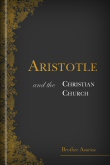
In Aristotle and the Christian Church, Azarias begins with the history of the Catholic Church and its relationship with Aristotelianism, from its condemnation by the Council of Paris in 1209 to its full recognition by the Legates of Pope Urban V. in 1366. Azarias then shows the spirit in which the Schoolmen worked to prove that the philosophy evolved by them is as distinct from that of the Lyceum as Saint Peter’s is from the Parthenon. Aristotle’s influence is there; his terms and his formulas are employed, but the inner spirit and the guiding principle are far different.
He is certainly successful in throwing light upon an obscure corner in the history of philosophy. He also vindicates the schoolmen from the charge of having been unduly influenced by the Aristotelian discipline. In 13 pregnant chapters, and in fascinating literary style, Brother Azarias works out his theme, showing the influence of the mighty Greek in the West and in the East, among the Arabs, in the Church, and in the university.
—The Critic
The essay contains useful information respecting the study of philosophy in the middle ages, and rightly maintains that, while the form is often Aristotelian, the spirit is Christian and therefore Divine.
—Alfred Plummer, The Classical Review
Brother Azarias (1847–1893) was the president of Rock Hill College, Maryland from from 1879 to 1886. Following two years of travel and research in Europe, Azarias returned to the United States and was a professor of literature at the De La Salle Institute in New York City. He was a frequent contributor to Catholic World and the American Ecclesiastical Review. His works include An Essay Contributing to a Philosophy of Literature, Phases of Thought and Criticism, and Essays Educational, Essays Philosophical, and Essays Miscellaneous.
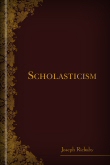
Scholasticism gives a clear account of the eponymous set of principles called Scholasticism. Rickaby gives a lucid account of Scholasticism’s origins, its rise in the thirteenth century, the causes for its decay and modern revival, and its place in ethics and politics. A short, succinct, and clear handbook for understanding the history and impact of scholasticism on Catholic doctrine.
. . . a little classic, which even the scholar can read and reread with unfailing delight.
—Fortnightly Review
We wish all able editors and every indolent reviewer would keep a copy of this little book, so clearly written and so easily read, within their reach. A clear understanding of the relations between faith and reason, thus so admirably sketched, would give relief, we feel sure, to many perplexed consciences.
—The Month
Joseph Rickaby (1845–1932), ordained in 1877, was professor of logic and general metaphysics at St. Mary’s Hall, Stonyhurst College. His works include Free Will and Four English Philosophers, An Index to the Works of John Henry Cardinal Newman, Moral Philosophy: Ethics, Deontology and Natural Law, and Of God and His Creatures.
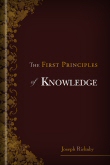
In The First Principles of Knowledge, Joseph Rickaby addresses the concept of “certitude” and explores the differences between metaphysical, physical, and moral certitude. He defends the Scholastic view of these concepts, and compares them favorably against antagonistic doctrines, particularly the principles of Hume and the pure empirics.
We have set forth in clear and vigorous English the doctrine of knowledge and the principles of reasoning taught by the learned and subtle Aquinas in the thirteenth century, but adapted to the needs of students and controversialists of the nineteenth century by teachers who, like St. Thomas himself, are able to discuss doubts without doubting, to converse with skeptics of every school, and still to hold to the faith.
—Inquirer
It is a hopeful sign of the times that a Catholic professor should freely enter the lists of debate in opposition to acknowledged masters of recent philosophy.
—Journal of Education
Joseph Rickaby (1845–1932), ordained in 1877, was professor of logic and general metaphysics at St. Mary’s Hall, Stonyhurst College. His works include Free Will and Four English Philosophers, An Index to the Works of John Henry Cardinal Newman, Moral Philosophy: Ethics, Deontology and Natural Law, and Of God and His Creatures.
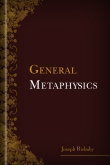
In this introduction to metaphysics, Joseph Rickaby explores this branch of philosophy in the following chapters:
- Being, and the Ideas Most Closely Connected with Being
- Nature and Need of Metaphysics
- The Notion of Being
- Essence and Existence
- Three Attributes of Being: Unity, Truth, and Goodness
- The Possibilities of Being
- The Finite and the Infinite in Being
- Explanation of Some Notions Next in Point of Generality to Transcendental Being
- Substance and Accident
- Substance as Hypostasis and Personality
- Causality
- Relation, Space, and Time
It will be seen, then, that we deny the merit of profundity to Father Rickaby’s work; it will, however, do more good than harm; it is full of a learning rare and curious in England, and is tempered by an English common sense and a real acquaintance with English thought.
—Athenaeum
Metaphysics is not a popular study, but Father Rickaby has done his best to popularize it. He expounds the idea of Being with its nature, existence, and attributes, and other notions less general, as substance, causality, space, and time. He ought to succeed in dissipating the common prejudice that metaphysics is mere cobweb spinning.
—Bombay Advertiser
If such a thing were possible, we would like to see this book in the hands of every thinking man in the land.
—American Catholic Quarterly Review
Joseph Rickaby (1845–1932), ordained in 1877, was professor of logic and general metaphysics at St. Mary’s Hall, Stonyhurst College. His works include Free Will and Four English Philosophers, An Index to the Works of John Henry Cardinal Newman, Moral Philosophy: Ethics, Deontology and Natural Law, and Of God and His Creatures.
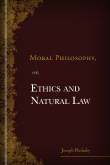
This volume focuses on the relationship between human acts and human nature. It covers ethics and natural law, addressing such topics as happiness, virtue, eternal law, duties to God, truth, marriage, rights, and much more.
The style of the book is bright and easy. The manual will be welcome on all sides as a sound, original, and fairly complete English treaty on the groundwork of morality.
—Dublin Review
The arrangement is methodical, and the style clear and condensed. Many of the sections are supplied with lists of passages for reading, selected from such authors as Plato, Aristotle, St. Thomas Aquinas, Paley, and Mr. Ruskin.
—Scottish Review
Father Rickaby, with his Aristotelian and scholastic training, is always definite and clear, distrustful of sentiment, with an answer ready for every assailant.
—Mind
Father Rickaby’s style of exposition will be found singularly clear and fresh, and his power of elucidating the bearing of an abstruse thought by some historical illustrations singularly happy. It should be specified also as one of the features in the book, that it keeps close on the track of Aristotle, and is careful to expound his pregnant but perplexing epigrams.
—The Month
The authority of the moral law is asserted admirably as a binding Imperative, and not as a mere utterance of the autonomous reason. And there are many true and valuable statements in most parts of the book.
—Church Quarterly Review
Joseph Rickaby (1845–1932), ordained in 1877, was professor of logic and general metaphysics at St. Mary’s Hall, Stonyhurst College. His works include Free Will and Four English Philosophers, An Index to the Works of John Henry Cardinal Newman, Moral Philosophy: Ethics, Deontology and Natural Law, and Of God and His Creatures.
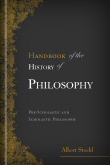
Well known and largely used in the Catholic schools of Germany, Albert Stöckl’s Handbook of the History of Philosophy: Pre-Scholastic and Scholastic Philosophy presents the history of philosophy up to the Scholastic period through a Catholic lens. Readers will find in this work a fullness of information on the schools of philosophy that have grown up within the Church or stood in close relation with her teaching, which here receive explicit and adequate notice.
This is a most excellent work, and a great boon for all Catholic students of philosophy. It is a great matter for Catholic students to have a work on this subject of high literary merit, and at the same time one on which they can safely depend.
—The Dublin Review
The book is encyclopedic in character and includes all the ramifications of European philosophy down to the period of thee Renaissance; and these are introduced by some readable summaries of the philosophies of the East. While the book is rather formidable as a handbook there is scarcely a paragraph or page that is dull. And this is due to the skillful arrangement of the material and to the easy flow of the clear English sentences. As the reader proceeds from the Hellenic Roman to the medieval period, he finds a wealth of material upon which the author has drawn for his elaborate expositions not only of the philosophy of the Christian schoolmen, but for those of the contemporary Arabian and Jewish scholars.
—The Journal of Philosophy
Albert Stöckl (1823–1895) studied philosophy and theology at Eichstädt; he was ordained in 1848. Although Handbook of the History of Philosophy is his best-known work, he wrote extensively on a wide range of philosophical topics, contributing frequently to Der Katholik.
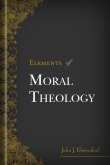
“Moral theology” is the science of the law of God as given to man, in whatever way it is given. “Moral philosophy” seeks to account for and develop, from reason only, the laws and principles of right living. This volume deals with moral theology, the science of the Divine Will as revealed to man. Based on the Summa Theologica by Thomas Aquinas, John J. Elmendorf’s Elements of Moral Theology covers beatitude, free will, good and evil, vice and sin, faith and hope, charity, justice and injustice, courage and fortitude, and much more.
John J. Elmendorf (1827–1896) was a lecturer of moral theology at Western Theological Seminary and the author of Outlines of Lectures on the History of Philosophy.
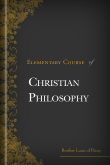
This textbook of Catholic philosophy is almost throughout an exposition of the Thomistic doctrine. Whatever material in the book is not directly derived from St. Thomas is drawn from the rich treasury of Scholastic writers. It begins with a section on Rational philosophy, and covers logic, ideology, and criteriology. The next section is on Real philosophy; it covers general and special metaphysics. The third section is on natural theology, and covers the existence and unity of God, the attributes of God, and the attributes of God in relation to the world. The fourth section covers Christian ethics, in particular individual law, social law, and the common law of nations. After these in-depth studies, Poissy turns to the general history of philosophy and outlines the major ancient, medieval, and modern philosophers and their teachings.
Brother Louis was subdirector of the Boarding School of Beziers.
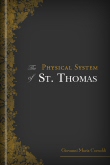
This volume aims at giving a digest of the Physical System or System of Physical Science from a purely philosophical point of view. Beginning with the essence and nature of corporal substances, Cornoldi covers the fundamental principles of Nature as taught by St. Thomas.
Giovanni Maria Cornoldi (1822–1892) entered the Society of Jesus in 1840 and taught philosophy at Bressanonoe and Padua. He belonged to the editorial staff of Civiltà Cattolica for 12 years, and his other works include Lectures on Scholastic Philosophy: Logic and La Divina Commedia.
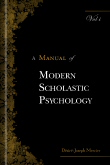
This two-volume manual covers all the major facets of scholastic philosophy. After an in-depth introduction to the study of philosophy, Mercier breaks down the study of scholasticism into eight major subjects. Each subject gets its own introduction and comprehensive treatment. Volume one covers:
- Cosmology
- Psychology
- Epistemology (Criteriology)
- General Metaphysics (Ontology)
Désiré-Joseph Mercier (1851–1926) was a Belgian cardinal of the Roman Catholic Church. Ordained in 1874, Mercier began teaching philosophy at Mechelen’s minor seminary in 1877, and in 1882, he was elected to Chair of Thomism at Louvain’s Catholic University. In 1901, he was elevated to Cardinal Priest of S. Pietro in Vincoli by Pope St. Pius X.
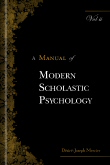
This two-volume manual covers all the major facets of scholastic philosophy. After an in-depth introduction to the study of philosophy, Mercier breaks down the study of scholasticism into eight major subjects. Each subject gets its own introduction and comprehensive treatment. Volume two covers:
- Natural Theology (Theodicy)
- Logic
- Ethics
- History of Philosophy
Désiré-Joseph Mercier (1851–1926) was a Belgian cardinal of the Roman Catholic Church. Ordained in 1874, Mercier began teaching philosophy at Mechelen’s minor seminary in 1877, and in 1882, he was elected to Chair of Thomism at Louvain’s Catholic University. In 1901, he was elevated to Cardinal Priest of S. Pietro in Vincoli by Pope St. Pius X.
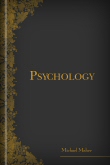
The aim of Psychology is not to construct a new, original system of psychology, but to resuscitate and make better known to English readers a psychology that has already survived for centuries and had more influence on human thought and language than all other psychologies together—and that still commands a far greater number of adherents than any rival doctrine. Maher not only expounds but expands on this old system; not only defends its assured truths, but tests, develops, and applies them to modern problems.
It supplies just what Catholic students have long needed, both as an aid to their own culturing, and as a work which they may confidently recommend to non-Catholics, as containing a fully developed, admirably arranged, and clearly written presentation of a system of psychology that is in accordance at once with Christian revelation, sound reason, and the facts and legitimate inferences of experimental science.
—The American Ecclesiastical Review
Its wide range of subjects and comprehensive treatment, together with the abundant historical information it contains, could not fail to recommend the book to students of all classes and denominations.
—New Ireland Review
Father Maher’s joining of old with new in his Psychology is very skillful; and sometimes the highly systemized character of the scholastic doctrine gives him a certain advantage in the face of modern psychological classifications with their more tentative character. The historical and controversial parts all through the volume are in general very carefully and well managed.
—Mind
Michael Maher was professor of mental philosophy at Stonyhurst College and examiner for the Diploma in Teaching at the Royal University of Ireland.
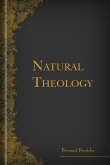
After an introductory chapter on the difference between natural and dogmatic theology, the author divides his work into three books: the first on the existence of God, the second on the divine attributes, the third on the action of God upon this world.
Father Boedder’s Natural Theology will be read with eagerness. The proofs of the existence of a Personal God are given with a completeness and clearness I have never before seen.
—The Month
The author is evidently well acquainted with Mill, Spencer, Huxley, and other contemporary writers; they are quoted freely, and clearly answered. Perhaps he is even more convincing in his replies to the subtle objections raised by Kant.
—The Dublin Review
Bernard Boedder was professor of natural theology at St. Mary’s Hall, Stonyhurst.
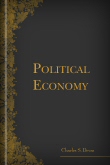
The names political economy, economics, and economic science, which are all three used as equivalents, express one of the moral or ethical sciences, and thus have as their subject matter the free actions of men. In this volume, Devas covers production and consumption, exchange, distribution, public finance, and more. Devas also includes two chapters on the scope and method of economic science and the history of economic science.
A concise but extraordinarily comprehensive textbook, with plenty of human interest, attractive illustrations from real life, and last, but not least, a clear, and on the whole a correct, exposition of the elements of economic science.
—Speaker
We can recommend it as an excellent textbook to all who desire a sound knowledge of the broad principles of Political Economy. And we recommend it all the more heartily that its teachings, while in accord with the best results of science, are in complete harmony with the precepts of social duty formulated by the Gospel.
—New Ireland Review
Will be found a valuable manual, both by collegiates and by individual students. The author gives special consideration to those problems to which attention is at present most directly attracted.
—The Pilot
Charles S. Devas (1848–1906) was educated at Eton and Balliol College, Oxford. His numerous works include The Groundwork of Economics, Studies in Family Life, and The Key to the World’s Progress.
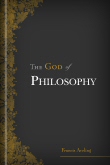
In simple language and from a philosophical basis, Francis Aveling states the natural proofs by which the existence of God is demonstrated. The first four chapters are concerned with certain preliminary considerations necessitated by the nature of the arguments themselves. Therefore, these introductory chapters treat the general principles, method, and distinctions separately in order that the actual arguments might not be cumbered with explanations that might draw attention from the main point. From chapter five onward, the scholastic proofs are set out in order with little extraneous matter.
Francis Aveling (1875–1941) was president of the British Psychological Society from 1926 until 1929. He lectured at University College in London until WWI, where he then served in France as a chaplain in the British Army. After the war, he taught at King’s College, London. His works include An Outline of Modern Knowledge, Directing Mental Energy, and Psychology: The Changing Outlook.
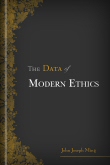
In The Data of Modern Ethics Examined, John J. Ming compares the purely materialistic system of ethics with the Christian ethics that it professes to have supplanted and cast aside. He compares them, not from the point of view of theology—that comparison would be of no interest to unbelievers—but from the point of view of philosophy and reason.
The result of the inquiry, so thoroughly and learnedly conducted by Dr. Ming, is a complete and triumphant vindication of Christian ethics.
—The Dublin Review
Professor Ming has done his work well, and thinking men will here find a book on ethics which is sound in principle, well arranged, and clearly stated.
—The Protestant Episcopal Review
John Joseph Ming (1838–1910) was educated at the Benedictine College in Engelburg, Switzerland and became a lecturer in theology in Görz, Austria. In 1872, he moved to the United States and taught at several colleges. He was a frequent contributor to such leading Catholic magazines as Messenger and American Catholic Quarterly Review, and his books include The Characteristics and the Religion of Modern Socialism and The Morality of Modern Socialism.
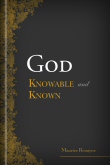
In God Knowable and Known, Maurice Ronayne draws out arguments that bear on the existence and knowableness of God. His aim is to show that, in the warfare with infidelity, the age-old arguments are as available at present as in any period of the past, and that as weapons of defense they need only be refurbished anew that they may be perfectly well fitted for modern use.
It treats the argument in an elevated and dispassionate way, giving in clear, logical, and devout setting the general array of reasons to which all theistic thinkers agree. These reasons are presented with strength and clearness.
—Public Opinion
Maurice Ronayne taught at St. John’s College, Fordham, and was the author of Religion and Science: Their Union Historically Considered.
Reviews
3 ratings

Daniel Caballero
2/1/2020

Unix
2/24/2019
This is a low-end Collection, I withdrew my bid several Years ago. Don't gather everything that has been said, buy I encourage most to bid on ancyclopedia Britannica (1912) instead - and bid high there! It is high-end. Fallacies include the felt need for low-end library and for many mid-level individual add-ons. I have libraries worthy of an author!


D D
5/7/2015
ATTENTION: Anyone reading this, the above collection Neo-Scholastic Theology and Philosophy Collection (24 vols.) has seemed to stalled in interest and so close to reaching the goal of producing the set. I would like to put out a plea to anyone who has ordered this set to consider raising your bid. I raised my to $50 in hopes that if all of us did even $5 above the already low price of $40 for this collection we could put it over the top into production and finally get a great set of books for our libraries. Please consider raising your $40 initial price to $45 to help push this product over the top. For those just looking....it's a GREAT price for these many texts. PLEASE ACT NOW! Thanks!
Harlan P. Hock Jr
7/14/2014
A lot of great textbook material, at a great price, during a time just before the decline.Brandon Munson
11/16/2013